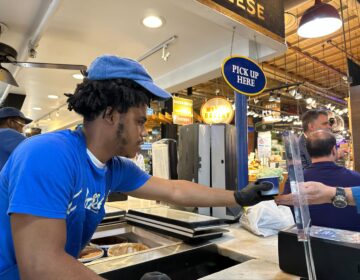Dishes we carry in our hearts: Ethnic food in Philadelphia
A event timed to Thanksgiving started after the 2016 election "as a way for us to start different kinds of conversations around immigration,” says one organizer.

Ari Miller serves fresh pita bread to accompany hummus at the Culinary Literacy Center at the Central Parkway Free Library. (Kyrie Greenberg for WHYY)
For immigrants, food can be a beloved slice of home as well as a way to build connections with new neighbors. Working on that premise — and as part of the series “Becoming U.S: Food and Culture” — the Pennsylvania Historical Society and the Free Library of Philadelphia’s Culinary Literacy Center teamed up to ask Philly chefs how immigrants shape the city’s palate.
But the term “ethnic cuisine” is thrown around too much, said chef Ange Branca, who owns the South Philly Sate´Kampar restaurant, famous for its Chinese and Malaysian dishes. If you can make it without a recipe, “that is what I consider ethnic food,” she said. “I can never cook somebody else’s ethnic cuisine, never, because I don’t own it.”
Cookbooks shouldn’t be the only reference point for cooking traditional cuisine, she continued.
“You have to hear the story from the people that grew up with it,” said Branca.
Take beef rendang, a Malaysian dish that’s simmered in coconut milk for up to a week for large celebrations.
“In the recipes, you will just see the curry and broth versions. But when the meat is cooked for seven days, you get this beef jerky, which is just as traditional,” she said.
The conversation used food as a window into the personal stories of immigration.
“When I got here, who was I friends with? British people. And the No.1 question was bread. ‘Where do you get your bread? The bread here is horrible,'” recalled sociologist Faye Allard who moderated the discussion. “And everyone was like, ‘Oh ho! I make my own.’ And I’m like. ‘Oh, dear.’”
Describing Philadelphia’s ethnically distinct neighborhoods, Allard pointed out the limits of food as common ground. “Initially, newer immigrants cluster together and as they assimilate, they spread out a bit. So food, depending on how you look at it, could be a place that is segregated or part of the process of assimilation.”
The event is part of a series started after the 2016 election “as a way for us to start different kinds of conversations around immigration,” said Beth Twiss Housing, senior director of programs at the Pennsylvania Historical Society. Members of the audience offered their own ethnic tastes as examples, which included crepes, paprikash, “meatballs” made with bread instead of meat, and collard greens.
Chef Chris Paul, who grew up in Haiti, said purists are often too rigid when determining whether a dish is authentic.
“We make a dish in Haiti called pikliz — it’s a spicy cabbage slaw. A lot of times, I’ll use habanero because the heat level is very familiar, instead of Scotch bonnet peppers,” he said.
Should a Haitian person question changes to the traditional recipe, Paul will insist the process makes it authentic.
Those at the event sampled hummus made by Ari Miller, founder of The Hummus Situation, who said a decade in Israel formed his lifelong bond with the dish.
“I remember we would go on school trips and bring cucumbers, bread and a baggie full of hummus that we would bite a hole through,” said Miller. Yet he doesn’t agree with those who describe hummus as strictly an Israeli food.
“I have old Israeli cookbooks that describe hummus as Palestinian or Arab,” he said.
Even without international politics, tastes can easily divide the dinner table. Paul and his wife founded Everything We Eat in West Philly, a company offering catering as well as cooking classes. He said he prefers fresh mango, while his wife, who is from Trinidad, prefers them pickled.
“She has a taste for the sourness, and I want them to be ripe and ready,” he said.
They both miss fresh mangoes.
“One of the biggest shell shocks of coming here, someone asked me if I wanted a mango … Sad to say, I found those big green things they have in the grocery store,” Paul said shaking his head.
WHYY is your source for fact-based, in-depth journalism and information. As a nonprofit organization, we rely on financial support from readers like you. Please give today.




